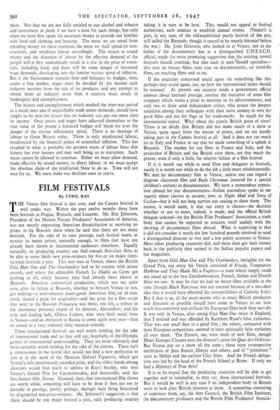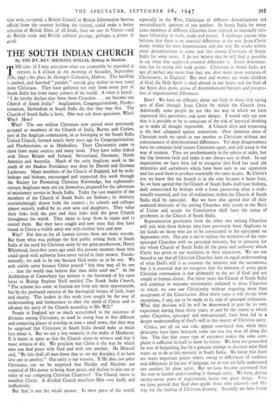FILM FESTIVALS
By CYRIL RAY
THE Venice film festival is just over, and the Cannes festival is well under way. Within the past twelve months there have been festivals at Prague, Brussels, and Locarno. Mr. Eric Johnston, President of the Motion Picture Producers' Association of America, was not merely expressing American dissatisfaction at receiving no prizes in the Brussels show when he said that there are too many festivals. For the sake of its own prestige, each festival wants to restrict its major prizes, naturally enough, to films that have not already been shown to international audiences elsewhere. Equally naturally, no producing country can find enough first-class films to be able to enter likely new prize-winners for five or six major inter- national festivals a year. This was seen at Venice, where the British Odd Man Out and The Overlanders had to be content with minor awards, and where the admirable French Le Diable au Corps got nothing at all, solely because they had already been shown in Brussels. American commercial production, which was not quite sure, after its failure at Brussels, whether to boycott Venice or not, got nothing—a semi-amateur avant-garde American film, on 16 mm. stock, shared a prize for originality—and the prize for a film script that went to the Russian Primavera was more, one felt, a tribute to the enormous personal charm of its director, Alexandrov, and his wife and leading lady, Orlova Liubov, who were both social lions in Venice—and an invitation to Russia to come again next year—than an award to a very ordinary little musical comedy.
These international festivals are well worth holding, for the sake of international trade and (as they still say, hopefully, of the Olympic games) of international understanding. They are more obviously and more certainly worth holding for the sake of the cinema. There isn't a camera-man in the world that would not find a new perfection to aim at in the work of the Mexican Gabriel Figueroia, which got Venice's only unanimously awarded prize, and the oldest hands among directors would find much to admire in Karel Steckly, who won Venice's Grand Prix for Czechoslovakia, and deservedly, with his first feature film, Sirena. Granted, then, that international film shows are worth while, something will have to be done if they.. are not to dwindle in prestige, partly, perhaps, through their being boycotted by disgruntled non-prize-winners. Mr. Johnston's suggestion is that there should be one major festival a year, each producing country taking it in turn to be host. This would not appeal to festival authorities, each anxious to establish annual events. (Venice's is part, in any case, of the old-established yearly festival of the arts, still called the Siennale, though it ceased to be merely biennial before the war.) Mr. John Grierson, who looked in at Venice, not as the father of the documentary but as a distinguished U.N.E.S.C.O. official, made the more promising suggestion that the existing annual festivals should continue, but that each in turn"Should specialise— this year on feature films, next year on documentaries, on scientific films, on teaching films and so on.
If the countries concerned could agree on something like this perhaps they could agree, too, on how the international juries should be manned. At present one country sends a government official anxious about national prestige, another the executive of some film company which wants a prize to mention in its advertisements, and only two or three send independent critics, who arouse the deepest suspicion among their colleagues with their naive anxiety to vote for good films and not for flags or for trade-marks. So much for the international aspect. What about the purely British point of view? There is no doubt that Britain did not make much of a show at Venice, quite apart from the matter of prizes, and we are hardly taking part in the Cannes festival at all. And it does not cut much ice in Italy and France to say that we made something of a splash at Brussels. The market for our films in France and Italy, and the projection of Britain and the British view there, are that much the poorer, even if only a little, for relative failure at a film festival.
If it is worth our while to send films and delegates to festivals, surely it is worth our while to do the job a little more wholeheartedly. We sent no documentary film to Venice, unless one can regard a diagram classroom film and Bush Christmas (entered for a special children's section) as documentaries. We have a tremendous reputa- tion abroad for our documentaries—Italian journalists spoke to me eagerly about classics as ancient, now, as Night Mail and Song of Ceylon—but it will not long survive our ceasing to show them. The reason, it would seem, is that our entry is chosen—the decision whether or not to enter, indeed, is made, and the official British delegate selected—by the British Film Producers' Association, a trade body that cannot be expected to concern itself unduly with the showing of documentary films abroad. What is surprising is that it did not consider it worth the few hundred pounds involved to send a distinguished director or two and a few pretty actresses to Venice. Most other producing countries did, and more than got their money back in the publicity they earned in the Italian popular papers and fan magazines.
Apart from Odd Man Out and The Overlanders, ineligible for the Grand Prix, our entry for Venice consisted of Frieda, Temptation Harbour and They Made Ma a Fugitive—a team which simply could not stand up to the best Czechoslovakian, French, Italian and Danish films we saw. It may be that we had no better films available at the time (though Black Narcissus was not entered because of a mistaken idea that it would have offended the susceptibilities of Catholic Italy). But if that is so, all the more reason why as many British producers and directors as possible should have come to Venice to see how zr_uch less contrived and artificial the European films look than ours do. It was only in Venice, after seeing Odd Man Out twice in England, that I noticed and was offended by Kathleen Ryan's false .eyelashes. That was one small flaw in a good film ; the others, compared with their European competitors, seemed to have spiritually false eyelashes all over them. The French, too, were short of new films, though Henri Georges Clouzot won the director's prize for Quai des Orfevres. But France put on a show all the same ; there were retrospective exhibitions of Jean Renoir, Dreyer and others, and of " primitives " such as Maks and the earliest Clair films. And the French delega- tion was led by the head of the French School at Rome. If only we had a Ministry of Fine Arts!
It is to be hoped that the producing countries will be able to get together and to rationalise, as they say, these international festivals. But it would be well in any case if an independent body in Britain were to look after British interests at them. A committee consisting of nominees from, say, the Arts Council, the British Film Institute, the documentary producers and the British Film Producers' Associa- tion with, co-opted, a British Council or British Information Service official from the country holding the festival, could make a better selection of British films, of all kinds, than we saw in Venice—and do British trade and British cultural prestige, perhaps, a power of good.



































 Previous page
Previous page